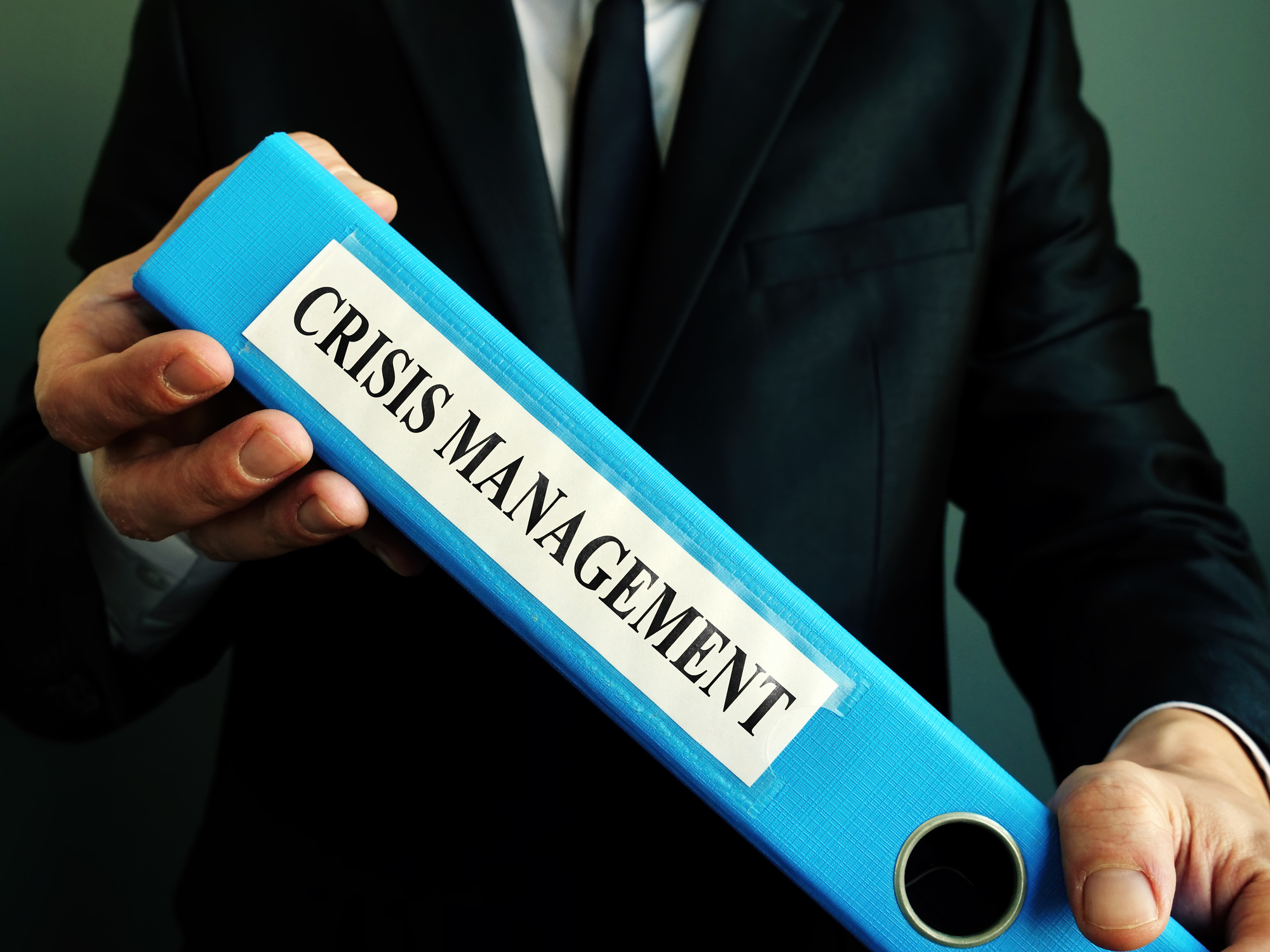David Oates is the kind of professional you hope you never need. A former U.S. Navy public affairs officer, Dave runs Public Relations Security Service, a San Diego-based crisis communications firm. Dave spends his days helping his clients prepare for, and communicate through, all kinds of crises, including employee and executive misconduct, cybersecurity attacks, product recalls, mass layoffs, large-scale accidents, criminal investigations, civil litigation, and more. A sought-after speaker, Dave taught a semester-long public relations program at San Diego State University, published three books, and co-produced two LinkedIn Learning courses, Crisis Communication for HR, and HR Communication in Today’s Fluid Workplace. In between clients, he gave HAI Group a crash course on how affordable housing organizations can plan for, and ace, crisis communications.
HAI Group: Thanks for talking with us, Dave. The affordable housing industry sees its fair share of crises. As far as preparation goes, developing a crisis communications plan seems to be a universal recommendation. Do you agree?
David Oates: Oh, for sure! Plenty of potential matters exist within housing that could get the interest of news organizations, the public, government officials, law enforcement, and other audiences. Fires, accidents, shootings, and other criminal activities are just the start. I could also see issues affecting the organization, but not the properties, that could damage the provider’s reputation. These include cyber attacks on the organization’s networks, employee misconduct, allegations of sexual harassment, and creating a hostile work environment. As highly visible as your members and policyholders are, creating and training to multiple crisis communications scenarios is essential.
HAI Group: Who do you recommend for the crisis response team?
DO: Senior leadership must take an active role, because one or more of them will likely act as a spokesperson for specific audiences. In addition to the marketing and PR team, I would include the chief executive officer or executive director, the chief operating officer or deputy director, the chief financial officer, and the head of human resources. You should include your legal team as well, particularly for matters that could result in prosecution or civil litigation. You’ll also want to have the heads of departments that communicate directly to government agencies, business partners, investors, and other stakeholders on the team.
David Oates
HAI Group: When a crisis does hit, who should act as spokesperson?
DO: Certainly, the CEO/executive director will be very visible in many instances, particularly to news outlets, employees, and government agencies. But others in the organization have essential relationships with key audiences, and those audiences will expect to hear from those individuals. The critical point here, regardless of who speaks, is that your message is consistent, on point, and conveys empathy and action.
HAI Group: What kind of training should spokespeople have, keeping in mind that budgets are tight?
DO: Training can occur without spending a lot of money. I’m a fan of creating scenarios and situational training. In other words, create real-life cases that you throw at a team to solve in a safe teaching environment. Doing so offers a practical approach that will help your team retain the information. Each training should take one to two hours and include mock interviews and conversations with all audiences. When my company is running a training, at the end of the session, we give everyone an overview of the things that went well and the things to keep in mind that they can do better. I also recommend throwing a small party to tell everyone how much you appreciate their efforts. By doing so, you’ll improve everyone’s ability to communicate through a crisis and create a positive work environment in the process.
HAI Group: Is it okay to use a hired firm to manage crisis communications, or is that a bad look?
DO: It’s wise to hire a crisis communications expert for these types of instances. During a crisis, emotions are running very high, and that can cloud judgment. Getting someone on board who’s “been there” can help you put together the correct response right away and give you the best chance to return to normal operations quickly. That doesn’t mean your crisis communications expert should act as the company spokesperson when things go south. In many cases, that can give audiences the impression that you’re hiding behind a shield at a time when being as open and transparent as possible can mean the difference between getting through a crisis and never recovering from one. Nevertheless, this advisor can stay behind the scenes and help you navigate through the chaos.
HAI Group: People expect a timely, transparent, and genuine response from leaders. But what do you do if there’s an active investigation? How do you come across as transparent when you don’t have all the facts? Is reading a prepared statement sufficient?
DO: I get it. There are times when you can’t say much without disrupting an active investigation. In those cases, you should explain what you can and can’t say and be ready to offer more information as soon as you can. If all you can do is provide a prepared statement, then so be it. Just be sure you follow up with more information as soon as possible.
This question brings up a couple of good points. First, it’s important in these cases to get your PR person and legal team talking to each other. They will likely have differences of opinion regarding the information that should be made public. Lawyers will want to limit the amount disclosed for fear of creating more liability risk. However, being too ambiguous in a press release or social media posts will cause more angst and anxiety with audiences. This friction will need to get ironed out—and fast.
Second, don’t speculate on the information you don’t know. If you don’t have all the facts, give audiences an idea of what you’re doing to find out. But don’t forecast what you may uncover. You'll look even sillier if your predictions turn out to be wrong.
HAI Group: How quickly do you need to respond after a crisis?
DO: Plan on responding within an hour. Today’s 24/7 social media and news cycle means any story—either by a news outlet or social media influencer with thousands of Instagram followers—can turn any organization of any size into an outcast within moments. Waiting until the day’s end or even longer can prove detrimental.
HAI Group: How do you gracefully decline to take questions from reporters?
DO: That depends. You’re out of luck if you’re not answering questions because they’re uncomfortable for you to address. Don’t avoid an inquiry hoping that a reporter or social media influencer will just move on. They won’t. More to the point, they’ll dig deeper because you're dodging the question. That said, if you can’t answer a question for legitimate reasons, such as privacy rules or that you don’t have the information at hand, say so. Don’t simply state, “No comment.” You’ll appear distant and evasive, no matter the question.
HAI Group: Can an organization acknowledge responsibility without opening itself up to liability?
DO: I’m not a lawyer, so I’m not sure I can provide a qualified answer to the legal liability risk. I’ll say this, though: Sometimes organizations create more significant PR problems that overtake the liability risk by not being open and transparent. That’s certainly true for public and affordable housing providers. If by not appearing empathetic and willing to act to fix whatever the crisis is, government agencies, business partners, taxpayers, and others will likely decide not to keep their relationship with you. That has everything to do with your inability to communicate and little to do with the legal process. Let me make one point here. By expressing empathy, I don’t mean to suggest that organizations must admit culpability if one doesn’t exist. But you must address the reality that audiences are feeling angst and uncertainly due to the crisis and perceive you to be involved somehow. Your messaging to them must convey a sense of understanding about that and a willingness to take action to help reduce that anxiety. You can often do so simply by telling them what you know and what you are doing about it.
HAI Group: What’s the best way to track—and respond to—external sentiment?
DO: The best outlet will be the one that your audience prefers. Press releases, social media posts, email newsletters, town hall-style meetings, phone calls, video conferences, and others can all be useful depending on the audience you want to address. Use the platform that best fits their communication preferences—not yours.
HAI Group: Is it essential to monitor and respond to social media comments, even if the organization isn’t active on social media?
DO: There’s a more significant issue here. If you’re not active on social media, you should be. That's how most audiences get information these days. Fewer folks than ever before watch the local 6 o’clock news or read the morning paper. They get their information from social media influencers and organizations like yours directly. It’s essential to have and maintain such a presence in today’s communications environment.
HAI Group: How can organizations keep employees in the loop during a crisis?
DO: Employees are your top priority in any crisis communications plan. Staff must always, always get informed about an adverse event before any other audience. It doesn’t matter what type of crisis. Your employees serve as your most effective and valuable marketing assets. They operate as your director of first and last impression. Provide staff with information about the crisis and empower them to convey your message clearly and effectively. Use the same outlets you use to convey other information to them. You’ll likely need to step up the frequency of your communications. Keep employees informed. It’s crucial.
HAI Group: Do you have tips for communicating to employees that they should not talk to the press?
DO: As you talk to your team members about the crisis, let them know how to forward inquiries from the press and to whom. Make it easy for staff members to do so in a timely fashion. Most don’t want to speak to the press. It makes them nervous, and they’ll want to know how to pass that request on. You’ll be doing them a favor by spelling out the process.
HAI Group: Do you have tips for handling a rogue employee who talks to the media?
DO: In general, employees talk to news organizations when they feel disenfranchised and disrespected. In the same spirit that you work to be open, transparent, and empathetic to external audiences, do so for your staff. Letting them feel like they’re in the know will help reduce this issue significantly. That said, I’m certainly not opposed to disciplining employees for failure to follow directives. Just be sure that any decisions are made to correct the issue of a staff member not adhering to established policies and practices. If the information they conveyed was accurate and it wasn’t confidential due to privacy concerns, I don’t believe the organization should punish them for telling the truth.
HAI Group: Anything else you want to mention to our audience of public and affordable housing professionals?
DO: Any organization can prepare for a crisis communications event. More importantly, they should. Few don’t, and it’s why so many organizations, like public and affordable housing providers, come under intense scrutiny.
HAI Group: Duly noted. Thanks for your time, Dave, and for sharing your expertise with our audience.
DO: My pleasure.
Visit the HAI Group Crisis Communication Center, tailored with resources to help housing agencies manage challenging situations and provide access to funded professional crisis communications support when media attention arises.
Contact our Risk Control and Consulting team for more resources, including our Business Continuity Plan (for HAI Group members) and answers to your housing organization's risk-related questions.
Interested in working with HAI Group? Our Account Services team is ready to assist you.
This article is for general information only. HAI Group® makes no representation or warranty about the accuracy or applicability of this information for any particular use or circumstance. Your use of this information is at your own discretion and risk. HAI Group® and any author or contributor identified herein assume no responsibility for your use of this information. You should consult with your attorney or subject matter advisor before adopting any risk management strategy or policy.
HAI Group® is a marketing name used to refer to insurers, a producer, and related service providers affiliated through a common mission, management, and governance. Property-casualty insurance and related services are written or provided by Housing Authority Property Insurance, A Mutual Company; Housing Enterprise Insurance Company, Inc.; Housing Specialty Insurance Company, Inc.; Housing Investment Group, Inc.; and Housing Insurance Services (DBA Housing Insurance Agency Services in NY and MI).








